Peter MALONE
Cosmic Sin
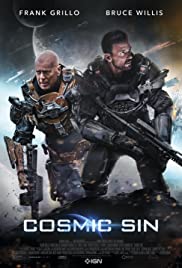
COSMIC SIN
US, 2021, 88 minutes, Colour.
Frank Grillo, Bruce Willis, Brandon Thomas Lee, Corey Large, C.J.Perry, Lochlyn Munro, Costas Mandylor, Adelaide Kane.
Directed by Edward Drake.
Cosmic Sin sounds as if it ought with the title of a vast narrative about explorations of space, or a documentary about climate change and its effects. The title has overtones of metaphysics and theology. However, none of this is found here. It is an 88 minutes science-fiction, futuristic action show.
The film opens with a mini kind of Star Wars explanation of what is happening in the galaxies. We move through settlement of Mars, upheavals, wars, bombings, alliances until we reach the 26th century. Almost immediately, there is a first contact with some ugly aliens (variations on the Darth Vader look) who are threatening an outpost of the Alliance. Contact Earth, check with the commanding officer, his immediate reaction to calling a disgraced official who had dropped a Q Bomb killing 70 million people.
The commanding officer is played by Frank Grillo – who then seems to disappear for most of the film, finally arriving for some desperate heroism. The disgraced official is played by Bruce Willis, playing the familiar Bruce Willis, deadpan, smirk, bald domination.
The screenplay gives the impression of being incomplete, that there should be a longer director’s cut, elaborating on a whole lot of the characters, explaining the situations for greater clarity and audience participation. However, a group is collected around the commanding, they go off in their private space shuttles to the outpost to confront the aliens and save the day, save Earth.
The film generally plays like an old B-budget space exploration but with more elaborate special effects. One of the main difficulties is that the 26th century on earth looks extraordinarily similar to the present day on earth, familiar vehicles, some familiar technology, no improvement in the swearing vocabulary of the future… Even the bulb-lit robot serving at the bar, the bar looking familiar as do the bar brawls, even spilling the drink as it pours.
Which undermines a great deal of the credibility of the whole enterprise. and the dialogue is, to say the least, extremely conventional and less than sparkling.
Just checking the bloggers on the IMDb within weeks of the film’s release, there is 99% condemnation of the film, many of the bloggers not feeling the need to restrain any of their comments! (But, there is the distraction in realising the young hero, Brandon Thomas Lee, is Pamela Anderson’s son!)
There is an odd character called Dash, a friend of Bruce Willis’s commander, wandering in and out, spouting what seems somewhat dumb dialogue and behaving, perhaps intentionally comic, in a dumb manner on some serious circumstances. Then, it comes as something of a shock to find that this is the actor, Corey Large, who actually co-wrote the screenplay with the director, Edward Drake. Were we missing something?
Minari
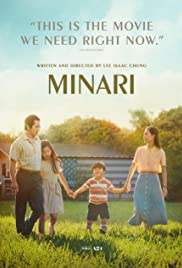
MINARI
US, 2020, 115 minutes, Colour.
Stephen Yuen, Yeri Hahn, Alan S.Kim, Yuh- jung Youn, Will Patton.
Directed by Lee Isaac Chung.
Arkansas. The 1980s. The Reagan era and hopes for prosperity.
Into the countryside with a family, Korean migrants who have been living and working in California, labouring with 16 chickens. The father Jacob (Steven Yeun)) has bought a property and is determined to support his family and live the American dream . The mother, Monica (Yeri Han) is sceptical, especially when she sees the trailer like dwelling. They have a daughter, Anne (Noel Cho), and a little boy, David and Alan Kim), who has a heart condition requiring him to be near a hospital. Jacob is single-minded. Monica is argumentative. The children are upset by the fights.
We know that this is going to be a struggle for survival. Jacob is independent, not wanting to pay for a water diviner, digging a well which may not supply sufficient water for his crops, Korean vegetables that he hopes to sell to Korean-Americans?. Bank loans, Monica working full-time with chickens, Jacob working part-time, buying a tractor. He also becomes friends with a local character, Paul (will Patton), hard-working, religious, eccentric as he carries a large cross along the roads every Sunday. The family are welcomed into the local church.
One solution for coping with problems is for the family to enable Monica’s mother to come from Korea to join them. Audiences may have been expecting a sweet old lady, but… She is tough, not against rough language, is unable to cook, snores, and David is forced to share his room with her. He is not pleased.
The strange thing about the drama is that while there is a great deal about the work on the farm, the work with the chickens, so much of the drama, with comic touches, is devoted to the relationship between the grandmother and David. In some ways, this makes the screenplay lopsided, many audiences much more interested in the story of grandmother and grandson rather than the problems on the farm.
As might be expected, in real life as well is in the drama like this, disaster looms. And there are complications with Monica thinking about leaving, Jacob becoming determined, more determined, testing his choices about family and farm. There is bad news with grandmother’s health. There is better news with David’s health. And, then, fiercely shown in the trailer, perhaps unfortunately, a fire.
And the title? The grandmother has brought with her and her from Korea (amongst some other local produce her drink which David detests, throwing it out and being into the glass and testing out his grandmother). She planted near a water hole where it thrives. A symbol.
Audiences have been very moved by this story and its characters, the struggle for survival, the hopes for success. Golden Globe winner for Best Foreign Language Film.
1. Awards and acclaim? A piece of Americana? Asian migrants in the 1970s and 1980s? Heritage?
2. The setting, the mention of the Reagan era and optimism? Arkansas, the countryside, the fields, the woods, waterhole? Farming? The home on wheels, the barns? The church? The visit to the city, hospital and doctors, Korean vegetable dealers? The musical score?
3. The story of a family, the background in Korea, but Monica, their names, courtship, marriage, their children? The dreams of settling in America, prospering? California, the years of chicken sexing? Jacob’s decision to buy the property, ambitions? To care for the family? Monica and her criticisms, disappointments, argumentative, the fights?
4. The home, the arrival, settling in, Jacob and his hopes? A larger property, development? The plan for Korean vegetables for the migrants? The need for water, the experience of the water diviner and his costs, not wanting to pay, finding a waterhole and digging? The encounter with Paul, the tractor, the deals, ploughing the fields, the vegetables? Working with Paul? The seasons, the rains?
5. The work for chicken sexing, Monica and the years of doing this work, Jacob doing this work throughout the day to get money, the friendly lady with Monica, and the pace of the work in Arkansas is slower than California? Monica and her patience with the work, bringing the chickens home, practising? The burning of the male chicks? Jacob, arms weary, dropping the box of chickens of the work?
6. The visit to the church, their being welcomed? Later visits to the church, the food afterwards, David and the encounter with me and his blunt question about his flat face? The
growing friendship, the sleepover, David teaching Johnny cards, the bond between the two? And, older than David, some teasing, making friends?
7. David, his health, his heart, blood pressure, his mother and the stethoscope? Not being able to run? His feeling this hindrance? His age, touch of mischief, relationship with each parent?
8. Financial issues, borrowing the bank? The decision to invite Monica’s mother? Her arrival, her manner, tough, not able to cook, the touch of the swearing, playing cards, David disapproving?
9. Paul, religious, the previous owners and the suicide, his wanting to exorcise the fields in the house, the image of him carrying his cross along the street, his religious practice every Sunday, Pentecostal, talking in tongues, prayer? The kids and their reaction? Jacob later bringing him into the house and allowing him to pray? His being welcomed for the meal?
10. The crops, the variety of vegetables, satisfaction? The lack of water, joining the local water distribution, the cost, running out?
11. David and his grandmother, sleeping in the same room, her snoring? Playing tricks with her, her liking Mountain dew, making the brew which she didn’t like, his being in the cup and her drinking? His father’s severity, the sticks and the punishment, holding his arms up?
12. The background of Jacob and Monica bickering, the heavy arguments, the effect on the children?
13. The grandmother, her/, the hospital, returning home, disabled yet participating?
14. The visit to the city, to the doctor, the good results, David’s heart and the hole lessening? Able to run? The visit to the food distributor, his welcoming the vegetables, the possibility of further contracts?
15. Jacob and Monica, Monica and her desperation, confronting her husband, wanting to make choices, her wanting to move, to leave, his options? His going to the dealer, her anger that he was making a decision for the farm? The farm over family?
16. Grandmother, at home, putting rubbish in the fire, it’s spreading, the burning of the barn? The family arriving, trying to save some of the produce? The collapse? The grief, walking away, David want him back, his running to catch her?
17. The grandmother and David going to the waterhole, Min Ari, her planting the seeds, the abundant growth, Jakob going with David, picking the Min Ari, a suitable crop?
18. Tragedy leading to some kind of hope, regrowth, bonding the family, finding a place in society, Koreans in the United States?
700 Sundays

700 SUNDAYS
US, 2014, 120 minutes, Colour.
Billy Crystal.
Directed by Des Mc Anuff.
Billy Crystal has been one of the most popular of American television and film stars. His television career ranges from Saturday Night Live to hosting the Oscars, as well as his beginnings in the television series Soap. And he has appeared in numerous films over many decades.
A native of New York City, educated at Long Beach, growing up in New York, later moving to Los Angeles for his film and television career. In 2001, after 9/11, he did a stage performance narrating the story of his life. He continued to do this and this is the film version of his live performance.
For Billy Crystal fans, there is no question. It is a highly entertaining narrative, Billy Crystal going back to his family home for so many decades, back to his childhood, stories of his father, his mother, brothers, the extended families, unusual uncles, strange neighbours, school hood friends. Crystal is an engaging personality, playing to the audience, playing to the camera, some have said flirting with the camera, enticing a genial response from the audience. (Some commentators, not so enthusiastic about Billy Crystal and his style have been highly critical of this relationship with the camera and the audience. however, fans have no difficulty.)
Crystal can certainly tell a story and does so throughout the film. He also has an extraordinary ability for mime, body language, an amazing talent with facial expressions. He can move from one pose to another with split second timing highlighting the drama or the comic impact.
There has been some criticism of his introduction of sexual references, body references and functions, some swearing, but this has been part of his life whether the audience appreciates it or not.
There is great deal of poignancy in his story, especially the way he tells the story of his father, the title of the performance referring to the time he had with his father, his business talent and the forming of Commodore services with his range of musical talent, the collapse of his business, his heart attack and sudden death, its impact on the young Billy at age 15, bewildered, feeling for years as if he was pushing a boulder through his life. Also strong descriptions of his mother, living with her, her support, going to work after her husband's death, her living on to 2001 when he was 53, his last phone call, his memories.
On the other hand, there is the revelation about his teenage sweetheart, Janice, and, at the time of performance, their 43 years of marriage, their two daughters, and then grandchildren. He praises her continued support of him, going to work, his minding the children, going out to comedy clubs during the night to get auditions.
At times, with his storytelling, his mime, his faces, his good timing, audiences will be laughing a great deal of the performance. And, it is mixed with the tragedy and the pathos.
For those who have not followed Billy Crystal in his career, this will be something of a revelation. And for his fans, an engaging two hours with the temptation to watch it again.
Born in Jerusalem and Still Alive
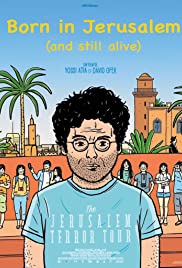
BORN IN JERUSALEM AND STILL ALIVE
Israel, 2019, 83 minutes, Colour.
Yossi Atia, Lihi Kornowski, Itama Rose.
Directed by Yossi Atia.
The title indicates theme and the attitude of the writer-director, Yossi Atia, who also takes the central role in the film. (This is obviously a very personal story for the director as it began its cinema journey as a short film for years earlier.)
We see Ronen, middle-aged, leaving his house, but going back to check whether the door is really locked. Touch of paranoia! A further reason for his paranoia is his not wanting to live with his father, though forever phoning and calling in to help him, his father wanting to be independent yet wanting his son at his side.
What Ronen does is to conduct terrorist tours in the centre of Jerusalem, Jaffa Street Jaffa Square, taking the visitors to the various sites of terrorist attacks, the blowing up of buses, shooters, suicide bombers, and stopping at the memorials. At first, he has only two Japanese visitors but one of them takes a shine to Ronen and comes on every tour, including a group of Japanese who are in Jerusalem studying the Bible. We see glimpses of many tours, a whole range of visitors, the tour is conducted in English.
Ronen meets an attractive young woman, Asia, on one tour when she asks a question and he is quietly smitten. She is an architecture student who lives in Barcelona, moves in with him at times, but is irritated by his rather passive manner. Ronen also has a friend who shares the house, Simon, never paying rent, but actually making a range of T-shirts about the tour. Ronen takes no money for conducting the tours. Simon, on the other hand…
The film is something of a glimpse at Ronen’s life, being born in Jerusalem, experiencing the terrorist attacks, still in many ways overcome by fear, surviving. (The screenplay is entirely focused on the Israeli experience, no attention given to any background for the Palestinians.)
1. Yossi Atia as writer, director, playing the central character? His previous short film? Personal identification with this story?
2. The title, the background of terrorist attacks in central Jerusalem, Jaffa Street and Square, Yossi Atia playing the central character, identifying with him? Born in Jerusalem, proud of it, the background of terror and deaths, his fears?
3. Ronen, his character, age, living with his friend, Simon, the contact with his father, not wanting to live with him, his father’s constant contacts, wanting Ronen to live with him, getting to fix things, yet refusing to wear the security band, not wanting anybody to come to help? Yet the danger of his falling? Ronen, at the gate, back to check the door locked? Indication of fear, the touch of paranoia?
4. Ronen, the idea of conducting the tours, the tours about terrorism in his street? Not charging anyone? The beginnings, the two Japanese, Shochai and his interest, continually returning, recruiting Japanese tourists, always accompanying Ronen? The particular visits, the spots, the buses, the detail, explorations, terrorists, shootings, suicide bombers, and the mounting number of deaths? The memorials, the idiosyncratic locked memorial? Ronen acknowledging some, passing others? Giving the candles to the tourists to place at a significant site for them? The continued success of the tours, the range of tourists, all in English?
5. The encounter with Asia, her asking questions, coming from Barcelona, architecture student, meeting with Ronen, the attraction, the dates, the discussions, her moving in, the effect on Ronen? Simon and his encouragement, his father’s comments? The breakfast and his moodiness, her anger, going back to Barcelona? The return, graduated, meeting Ronen again, the bond between them?
6. Shochai, the Japanese, studying the Bible in Jerusalem? His devotion to the tours? With Simon at the end?
7. Simon, not paying the rent, the T-shirts for the tour, Ronen not wanting any money, moving out for the final tour, Simon taking the tourists and asking for $25 per tourist?
8. The impact of the film for Israelis, their memories, attitudes towards the Palestinians and violence, terrorism? Those who live in Jerusalem? For younger audiences who don’t share the memories? For non-Israeli audiences and the memories of the terrorist attacks? (No perspective of the Palestinians and their motivations?)
Then Came You
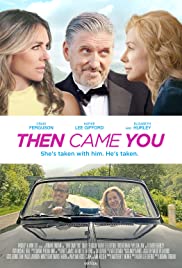
THEN CAME YOU
US, 2020, 97 minutes, Colour.
Craig Ferguson, Kathie Lee Gifford, Ford Kiernan, Phyllida Law, Brett James, Elizabeth Hurley.
Directed by Adriana Trigiani.
With a title like this (and a valid song with the same title at the end), this has to be a romantic comedy.
And, it is, but with a difference. The target audience for Then Came You is women of a certain age. And the central character is a woman of that same certain age, Annabelle, played by actress and television host, Kathie Lee Gifford, who also wrote the screenplay, obviously empathising with the experiences and feelings of this kind of woman of a certain age.
Not that the film is not entertaining and targeted also for men of a certain age. Actor and writer, Craig Ferguson, plays Howard, the owner of a mansion in Scotland, near Loch Lomond. He is a widower, living rather reclusively, but making rooms in the mansion available for tourists. Annabelle books in and leaves her home in Nantucket where she lived with her late husband, working in his hardware store, and sets out for a tour of the world, beginning in Scotland.
Perhaps it is a Scots characteristic, but Kathie Lee Gifford gives Howard quite a lot of antagonistic comments, especially concerning Americans, their rather extroverted attitudes and behaviour, different vocabulary (petrol and gas) and on which side of the road to drive. After Howard picks up Annabelle from the railway station, it is only a few moments of screen time before they are arguing, Howard running out of petrol, Annabelle irritatedly walking the rest of the way…
Obviously, we know how it is all going to end up, but the enjoyment of this kind of story is getting to know the characters, experience their cantankerousness, become more comfortable in their getting to know each other, an experience of some crisis or other, and…
One of the complications is that Howard has decided to marry an attractive business woman from London, and, with some glamour, she is played by Elizabeth Hurley. Clearly a match not made in heaven, even Howard’s son not wanting to come to the wedding.
But, it turns out there is a reason for Annabelle coming to Scotland, to this particular part of Scotland, which has a connection with her late husband and a family connection of Howard’s, an old lady played by Phyllida Law (in her late 80s). The other character on hand is Gavin (Ford Kiernan), a plumber, Howard’s good friend and handyman.
Annabelle is, as they say in America, quite feisty. Howard, a touch of the Scot dour manner, has feisty in him. So, we are treated to something of a low-key battle of the sexes, a sexual encounter which needs to be reflected on by the two, Annabelle wanting to go on her way, but, of course, finding her way back.
There are quite a number of songs throughout, and the credits indicate that they have been written by Kathie Lee Gifford herself, along with her writing partner and musician (who appears with her in the pub sequence singing a key song, Whiskey and Wine, which Howard in fact detests), Brett James.
One of those easy entertainments for a morning or matinee gathering at the local cinema with refreshments.
1. A romantic comedy for older audiences? Impactful women? Impact for men? The screenplay written by Kathie Lee Gifford, female director?
2. The Scottish settings, Loch Lomond, the mountains, the village, shops and clubs, cafes? The mansion, its interiors? The grounds? The musical score, the range of songs, the title song, Wine and Whiskey…?
3. Annabelle’s story, from Nantucket, widow, her husband’s ashes, in the chocolate box and Forest Gump, laminated, taking them everywhere? Selling the business, financially viable? Plan to travel the world? Contacting Scotland, booking the accommodation? An ordinary woman?
4. The travel, at the station, meeting Howard, the drive, the initial sparring, Scots criticism of Americans, out of petrol, her walking? Meeting Gavin? The room, settling in? The discussion with Howard about her husband, his ashes? Her life with him, missing him?
5. Howard, age, widower, not revealing his story to Annabelle? Scot? Critical? Relying on Gavin, plumbing, waiting at table…? Best friends? Howard and the cooking, doing all the work himself? The meals? Discussions with Annabelle? Her going fishing, the midges, falling in the water? The revelation of his plan to marry Clare, her intentions, wealth, redesigning? His son refusing to come to the wedding? Setting up the marquee and the plans for the wedding?
6. Annabelle, bike riding, shopping, spree? In town with Howard? The drink, the American waitress? Going to the club, urging Annabelle to sing? Howard leaving? Drunk? The bike riding?
7. Gavin, his character, the plumbing, working around the estate, friendship with Howard, advice? Friendship with Annabelle? His home life, rowdy – but his?
8. Clare, her visit, Elizabeth Hurley, the style, plans, wanting to eat out, the meal at home, Gavin and his offhand serving? The questioning Howard about Annabel? Howard breaking off the engagement, her leaving?
9. Annabelle, getting to know Howard? The attraction, the night together, the consequences? Her intending to go on to Italy? The crash into the sheep? Walking, at the station? With Gavin?
10. The train leaving, the empty seat? Howard, at home, by himself, Annabelle returning? His son visiting? The buildup to the wedding – Annabelle and her finances, the tree house and their future?
11. The impact for the older audience – any impact for a younger audience?
Painter and the Thief, The
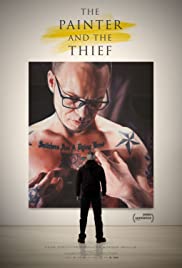
THE PAINTER AND THE THIEF
Norway, 2020, 98 minutes, Colour.
Barbora Kysiklova, Karl-Bertil? Nordland, Oystein Stene.
Directed by Benjamin Ree.
An audience coming upon this film without any fore-warning, would assume that it is a drama, a fictional story – and that is the way that it plays out. It comes as something of a surprise to find that it is, in fact, a documentary.
The central character is a Czech artist, Barbora Kysiklova, with a very distinctive visual style, using photographs but developing characters and situations with sketching, pencil drawing, a fast pallet of paints and high imagination. She is living in Oslo, the film explaining that she had an abusive relationship in the Czech Republic but was rescued by a writer-director, Oystein Stene, and moved to Norway, where she has been successful, mounting an exhibition.
There are many sequences throughout the film showing her at work, different moments in her process of painting, and close-ups of many of them.
The complication comes when two of her paintings are stolen from a Gallery. Surveillance footage is shown of the theft. However, the thieves are apprehended fairly quickly, there is a court case.
The other central character is one of the thieves, Karl- Bertil Nordland, and the documentary shows Barbora’s portrait of him as well as offering a visual and psychological portrait of him himself. A harsh growing up, some talents in carpentry, intelligent, addiction, prison, involvement in the theft.
Which means that the central drama is the relationship between Barbora and Karl- Bertil, her questions, his responses, their being comfortable in each other’s presence, her decision to paint him, his extraordinary and weeping response to seeing the first portrait, more portraits, especially of his hand and its wound which looks like stigmata.
Documentary film-maker, Benjamin Ree, also one of the cinematographers, follows each of the characters over the years, Karl Bertil and his reckless car accident, hospitalisation, another prison sentence, and sequences in the prison (so much more civilised than those huge American prisons with surly and violent prisoners in yards). The filmmaker also follows Barbora, some sequences of marriage counselling, her growing involvement with Karl- Bertil, especially in his rehabilitation after the accident, not communicating with him in prison, but their meeting again, he something of a different person, clean and with ambitions to do something with his life as he turns 40.
The film keeps part of its intrigue until the final 20 minutes, some revelations about what happened with the theft and the consequences.
Audiences will wonder how the documentary came to be made, has it has such access to surveillance, the art, to the lives of the two characters. The IMDb (under the unfortunate title, Trivia) offers some detailed information – to be read after the viewing of the film.
The film started as a short documentary, but the filmmakers changed their plan when Karl-Bertil? saw himself painted for the first time. Then they decided to keep on filming for many years to come. They filmed from 2016-2019 not knowing what would happen or where the story might go.
Interesting?
The reason why Barbora Kysiklova (the painter) is speaking English in the film is because she doesn't understand Norwegian.
From the director's statement: "From the moment I began filming I wanted to explore the complex friendship between the painter and the thief. Two questions were the driving motor: What do we humans do to be seen and appreciated, and why do we help others? For me, filmmaking is about asking intellectually stimulating and emotionally engaging questions through observing human behavior. I hope I have managed to raise some intriguing questions with this film, questions you will think about long after the end credits. I have also tried to push the cinema verite form onto a new path, with several perspectives jumping back and forth in time, revealing new layers of the friendship throughout the whole film. I have worked hard to find a cinematic form to suit the content for each scene, that reflects the inner state of the characters."
A friend of Barbora began filming her already back in 2014. She took photos and filmed the making of the two paintings that later would be stolen and she was also there during the exhibition. She also participated in the trial. The courtroom recordings are the actual recording of the first meeting of Karl-Bertil? and Barbora. Together with the CCTV footage, these archives makes up the beginning of the film.
The filmmakers read about the robbery in various Norwegian newspapers. They contacted Barbora and began filming her first, and it took some time to get access to film Karl-Bertil? (the thief). They began filming him the 4th time Barbora and Karl-Bertil? met.
1. A portrait documentary? Of the painter, her life, her work, her crises? Of the thief, his background, addictions, prison, rehabilitation?
2. The making of the film, work with the artist, the experience of the theft, the recording of the court case, following the central characters over several years?
3. Oslo, Norway, homes and studios, galleries, the streets, harsh lodgings? The prison, interiors? The musical score?
4. Barbora’s paintings, so many, seeing her at work, sketching, pencil, paints? The range of subjects, her style? Photography? Creativity?
5. Barbora story, the abusive relationship in the Czech Republic, meeting Oystein, the relationship, her success and work, the exhibition, the theft, the repercussions? The court case? Her getting to know Karl- Bertil? Painting him, discussions, more paintings, more conversations? The bond between them? His crash, hospital, recovery, in prison but her not responding to him? His getting out, renewing the friendship, discussions, her story of the finding of the stolen painting, his helping her with the carpentry and mounting it?
6. Karl- Bertil’s story, photos from the past, the harsh childhood, his father, possibilities, carpentry, studious and intelligent, psychological condition, drug addiction, the theft, his not remembering it, the discussions with Barbora, his posing, with his girlfriend, the effect on him? His weeping on seeing the first portrait? Drugs, the crash, the penal code, his imprisonment? The regime in the prison, civilised, comfortable, yet locked in, psychological help? His getting out? His ambitions, to find someone, to make a life and family, training to be a nurse, his carpentry work? Meeting the vice principal, their life together? Trying to contact Barbora, her response? The discussions with her, the painting of his wounded hand? Learning about the recovery of the painting? Helping her with the carpentry to mount it?
7. Oystein, his background as a film director, the relationship with Barbora, discussions, support, relying on him, his changing her life? His meetings with Karl- Bertil? His concern, the going to the marriage counsellor and the discussions, Barbora’s reaction?
8. Barbora, the second thief, the surveillance footage, his going to prison, her tracking him down, the discussions, his information about the Mafia boss, the storerooms, her
discovering the painting, lying on it? Taking it home? The preparation for the exhibition? Karl Bertil helping her?
9. In the final image of the painting, Karl-Bertil? and his girlfriend, Barbora substituting herself?
Max Richter's Sleep

MAX RICHTER’s SLEEP
UK, 2019, 99 minutes, Colour.
Directed by Natalie Johns.
No, this is not a documentary about the sleeping habits of Max Richter. Rather, it is something of a portrait of Max Richter himself but one more, a focus on his composition, Sleep.
Max Richter was born in Germany but is an international composer and performer. His IMDb credits list indicates a range of compositions as well as the scoring of films and television series.
Sleep is a musical composition but also its performance is an event. And that is how the film begins, the introduction to a performance of Sleep, in the Grand Park of Los Angeles (with some glimpses of the performances in Amsterdam, in the UK, and in the Sydney Opera House). We discover that Sleep is an eight hour composition and performance.
We see audiences gather at the Grand Park, allotted cots available for people who want to lie down, people bringing pyjamas and blankets, settling into the cots. There are all talking heads, a range of people who indicate why they are coming to this performance and what they might expect. For the first 10 minutes or more of the film, the audience settles down and the performance begins, very quietly, the music in the background, lulling, soothing…
Then the documentary moves into interviews with Max Richter himself, the great support he has from his wife, interesting information and comments from her. We see them together, at home, ordinary sequences.
And, the rest of the film is an intercutting between the portrait of Richter and the performance of Sleep. The music plays in the background, quietly, Richter at the piano, chamber music with six performers, solo violinists, and a singer. And there is a synthesiser on stage blending the musical experience.
The aim of the experience and its art is for people to move into restful consciousness, to sleep itself, perhaps to dream, different stages of awareness, waking, resting, sleeping again, the whole performance starting at 10 PM, moving to early dawn and sunrise and the beginning of activity in the city, coming to an end to begin the day at 6 AM.
The music style is classical, generally slower and quieter, even inducing for the film audience to nod off…
For audiences who want narrative in their films, it is minimal here. For audiences who want a different cinematic experience, aural and visual, this one is different.
They Call Me Dr. Miami
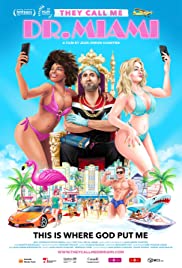
THEY CALL ME DR MIAMI
Canada, 2020, 78 minutes, Colour.
Michael Salzhauer.
Directed by Jean Simon Chartier..
Florida and plastic surgery enhancement? Okay? Florida, plastic surgery amendment, social media entertainment promotion? Okay. Florida, plastic surgery amendment, social media entertainment promotion and Orthodox Judaism? Say that again!
But, that is what this cheery documentary is about. A word of caution for those who have second thoughts about this kind of plastic surgery: there are quite a number of close-ups of incisions, cutting, like the suction… And, while the thrust of the film is in support of the procedures, the screenplay does include a number of warnings about the dangers of such plastic surgery, a warning about deaths in surgery, some critiques of the desire for this kind of enhancement, Vanity experiences, in a comment about contemporary life as a series of spectacles.
And who is Dr Miami? Actually, the film indicates that a number of rap artists including caption at Dog include references to him in their rap performances. He is Michael’s Salzhauer, from Miami, nearing 50 at the time of filming but full of exuberance, commitment to his profession, and a star of social media.
Dr Miami believes in his profession and is qualified (the film having a number of references to unqualified practitioners of this kind of plastic surgery, then not being registered, responsible for deaths, especially for plastic surgery tourists from over the world). In his own life, he has been married for 24 years at this stage, the film including interviews with his wife who seems a very sensible person, understanding a husband well, able to talk to camera interestingly about him as a person and as a showbiz phenomenon. He has four children – with his oldest daughter disagreeing completely with him about plastic surgery enhancement.
Throughout the film there are interviews with various women, giving their reasons for surgery, generally explaining that they wanted to be their true selves and that the enhancement would make them feel free. There are also some comments about falls beauty standards and decisions about surgery because of conformism. There are also, of course, a great number of close-ups of breasts and bottoms, presurgery and after surgery.
Dr Miami got caught up in social media, instant brand, Snapchat, leading to his creating quite a persona, extroverted, comic, in all kinds of extravagant situations (only in America?). And there are plenty of clips of these throughout the film. And, he is also interviewed sitting on a throne.
And, not forgetting the Judaism which is an essential part of his life. He and his wife were not practising Jews but he had a conversion experience, and Orthodox Judaism has been part of his and his family’s life for a long time. There are quite a number of sequences where he explains his religious faith, many sequences where he is seen practice and practice, discussions with Rabbi, prayer shawl and prayer books, visits to the synagogue. Practice is important for himself and his children – and the older daughter, who disapproves, draws on her experience of her Orthodox face faith to explain her stances.
Only an hour and a quarter, but a lot of information, more about plastic surgery and then most of us needed to know, a whole lot of razzmatazz promotion, and, underlying it all, Dr Miami is faith.
Blackbird/ 2019
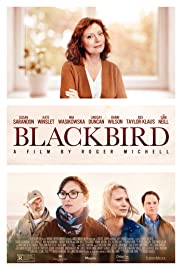
BLACKBIRD
US/UK, 2019, 97 minutes, Colour.
Susan Sarandon, Kate Winslet, Mia Wasikowska, Sam Neill, Rainn Wilson, Lindsay Duncan, Anson Boon, Bex Taylor- Klaus.
Directed by Roger Michel.
In many countries around the world, and in various states in Australia, legislation has been introduced, and sometimes passed, concerning assisted suicide. This is a very human drama about assisted suicide.
Opinions are divided about the morality, the ethics of assisted suicide. There are ongoing discussions, legal submissions, protests… In its way, Blackbird will contribute to the discussion and should be seen by those on each side of the debate. In many ways, it is easy to discuss moral issues in principle, discussions by reason. On the other hand, the reality concerns people, those dying, those assisting, who have lives which are highly emotional. And that is the value of a story like this, which at various times does present arguments against, the moral issues are both principled and personalised.
Blackbird is an English-language adaptation by its author, Danish Christian Torpe, of his original, directed in Denmark by celebrated film-maker Bille August, 2014, Silent Heart.
The film invites the audience to share a weekend with Lily and Paul, Paul a doctor, Lily suffering from an increasing illness with symptoms which sound like motor-neuron disease. Lily and her husband, along with her daughters and best friend, have planned how the assisted suicide will take place. And they are to have a weekend celebration of life before it.
Susan Sarandon is Lily and gives, and this is compliment, a very strong Susan Sarandon -like performance. After 50 years top lining films, she is still a force to be reckoned with. On the other hand, Sam Neill plays Paul, a rather quiet, supportive performance.
Much of the dramatics are provided by the two daughters. The older, Jennifer, is played by Kate Winslet, wearing glasses and almost unrecognisable at first. She is married, her genial husband Michael (a different kind of role for comedian Rainn Wilson) and her son, Jonathan (Anson Boon), a rather quiet teenager, arriving with her. There is quite a contrast with the younger daughter, Anna (Mia Wasikowska), an emotionally unstable woman who is accompanied by her partner, Chris (Bex Taylor- Klaus). The other member of the party is Lily’s lifelong friend, Liz (Lindsay Duncan). And that is the cast – most of the action taking place within the family house with excursions along the beach.
As audience, we are drawn in by the characters themselves, generally strong personalities, genial and friendly at first, meals, charades, happy spirit of reunion. However, there is soon a clash between Jennifer and Anna, Jennifer a controller, Anna, possibly bipolar, a suicide attempt and time in an institution. An even stronger tension arises when Jennifer questions the friendship between Liz and Paul. And, even Lily herself Is shocked at Anna’s initial recriminations against her.
And a lot of this occurs in the context of the creation of a Christmas celebration, Michael and Jonathan going out to find a Christmas tree, Paul cooking a full Christmas dinner, Lily with very personalised gift for everyone.
There are differing opinions given about the assisted suicide, the daughters wanting more time with their mother, but Lily, very strong in her declarations about her wish to die, not to live in a continually deteriorating physical condition, to leave the world at the time of her choice and reasons.
As said, this is a case study about assisted suicide, a story with a perspective, that those for and those against should experience as a fuller background for their ethical stance.
1. The title? Reference? Bye, bye Blackbird?
2. The Connecticut setting? Filmed in West Sussex?
3. The screenwriter, adapting his Danish screenplay? The transition to an American context?
4. Character and dialogue? Action over the weekend? The interiors of the house? The excursions to the beach? The musical score?
5. The situation, B, her health, the decision to end her life, to gather the family together, to celebrate, the assisted suicide, the mercy killing?
6. Audience response to assisted suicide, in favour, against? The film as a case study, for both sides of opinion? To understand the issues? Moral, ethical? To experience the emotional repercussions?
7. Lily and her strong character, age, the Susan Sarandon performance? The nature of her illness, arm paralysis, prospects, motor-neuron symptoms? Her cheerful spirit? The careful planning of the weekend? A love for her husband, over many years? Liz as her best friend? Her relationship with her daughters, Jennifer and her control, older? Anna, mental issues, emotional instability?
8. Paul, quiet, longtime husband, Dr, in the house, participation in the plan? Welcoming all the visitors? His relationship with his daughters? With Liz – the kiss and the revelation that Lily had encouraged the relationship? Cooking, hosting, tears and sadness? Administering the drugs? Finally turning out the lights, going for the walk, his explanation that he was away, for the police?
9. Liz, longtime friend, memories of study days, references to Woodstock, drugs? Her relationship with Paul, present on all the holidays, urge to the relationship by Lesley?
10. Jennifer, Kate Winslet wearing glasses and unrecognisable, age, a controller, comments to her husband, corrections for her son? Intervening and doing the jobs? A love for Michael? Her attitudes towards Jonathan? Her relationship with her mother, the walk on the beach and the place of conception? Her antagonism towards Anna? The challenges, the discussions, going back over the past, their childhood? The issue of the affair with Liz? Drawing attention to it? Controlling the situation? Her mother’s response an explanation? The two daughters and that not wanting their mother to kill herself? Wanting time with her? Their mother’s strong talk, what she wanted, they’re acquiescing, on the bed when she died?
11. Michael, relationship with Jennifer, genial, with his son, participating in the weekend? Taken aback at times? Jennifer and her finding the photos, talking about the affair, the sexual encounter and his reaction? Finding the Christmas tree with his son?
12. Jonathan, age, relationship with his parents, quiet, talking with his grandmother, telling her he want to be an actor, telling everyone at the table, is wrapped performance, is cheering up, wanting to know the truth about the situation?
13. The celebrations, the meals, the wine, the talk, the shrouds, the celebration of Christmas, the tree, decorations, Lily talking with Johnson and his helping her, her special gifts to everyone at the table?
14. The dramatics, the shifts in mood, Billy and her shock about Ana’s reaction, the reconciliation? Liz and the affair and Lily’s declaration? The daughters and their upset?
15. The audience involved with characters, a case study, the presentation of the varied points of view?
Night Clerk, The
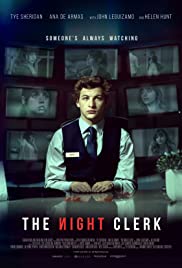
THE NIGHT CLERK
US, 2020, 90 minutes, Colour.
Tye Sheridan, Ana de Armas, Helen Hunt, John Leguizamo, Jonathan Schaech.
Directed by Michael Cristofer.
Tye Sheridan gives an impressive performance as a 23-year-old night clerk in a small suburban hotel. The significant aspect of his performance is that he is portraying a young man with Asperger’s Syndrome. He is Bart, finding a position as a night clerk, very efficient in his job, saying the right things, but very formal in his way of communication.
In fact, the screenplay gives Bart many opportunities to explain to guests, and then to the detective investigating the murder which takes place in a hotel room, how someone with Asperger’s functions, explaining that answers can be quite complicated, taking a long time – and, at various times, this is what happens as he goes through rational explanations, analyses, giving historical information.. While some of the characters let this pass, the explanations are helpful to the film audience.
Bart is something of an obsessive, with surveillance cameras in each of the rooms of the hotel, his watching what goes on, ostensibly to train himself in how to respond better to people, but preoccupied with the behaviour of the guests, especially when he goes home to his elaborate multi-screen studio. Bart is cared for by his mother, played by Helen Hunt, who is protective of him.
Bart watches one of the guests and a violent struggle with a visitor, leading to her death. Bart has it all on his USB sticks. But, does not give them to the police. Because of his behaviour, watching the scene from home and then hurrying to save the woman by returning to the hotel, he comes under suspicion, especially with the interrogations by the detective, played by John Leguizamo.
Bart is transferred to another hotel, encounters a young guest, played by Ana de Armas, friendly towards him, discussing his emotions and loneliness, his becoming concerned for her, protective, even having a haircut, buying new clothes, a bouquet to impress her. But, he sees her lover, whom she had explained to Bart.
Eventually, but Bart does hand over the tapes – but, the aspect of the murder and the investigation seems to take second place to the portrayal of Bart and his character and behaviour.
Best to have low expectations about the crime, better to have higher expectations for a film portrait of a young man and his living with, way of dealing with his Asperger’s Syndrome.
1. Title? The focus on Bart? His work? His personality? Aspergers?
2. The settings, the hotel interiors, front desk, rooms, on surveillance monitors? Homes? The streets? The musical score?
3. The film is a psychological drama, the personality of Bart, aged 23, Apergers, his explanations and elaboration of the condition, exemplifying it, intellectual responses, descriptions, and analysis? The lack of emotional response? The need to study other people for behaviour? Obsessive? The cameras, the screens, his watching on his computer, his system at home, recording people and situations? Continued watching? His relationship with his mother, affectionate, his way of showing it, her love and meals? Eating alone, the final coming up to eat with his mother? His efficiency at his job? The way people treated him, understood him, or not?
4. The guest at the hotel, going into the room, but studying her? Opening the door, the visitor, the violence, brutality, but watching it at home, his return, the gunshot, preoccupation with the blood, the USB sticks, his fellow worker, 911, the police?
5. Bart, his story, the lies, searching for his wallet, placement, the question about how he played paid for the ice cream? (And his comment about the bright shirt?) The meeting with the detective, the questions, his mother trying to protect him, his stories?
6. The boss, talking to the police, but on the transfer, meeting Andrea, talking, filming, responding to the film? Her encounter with him and a shopping? His explanation of his condition, her response, the story of her brother and dying in the institution? The cigarette, the match, the swimming, bringing the towel, wanting to be a lifeguard, the conversation?
7. Andrea, Bart and the beginnings of affection, kiss, her response? Bart’s response, the haircut, the new clothes – and the blunt talking to the obese salesman, not wearing what old people wear, the perfume and the photo? The flowers, his seeing Andrea with the man? His withdrawal? Broken heart?
8. Andrea coming, talking with him, the night, the affection, the effect? The discussions with the lover, the background, the discussion about the tapes? Driving away?
9. Bart, brooding, the gun, fears about him? The police getting the tapes? The truth, pursuing the car with Andrea and the lover?
10. The consequences for Bart, his future?